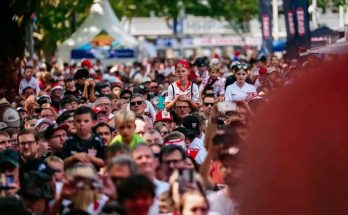In the storied history of the NBA, rivalries have often defined eras, shaped legacies, and delivered unforgettable drama. But some moments transcend the game itself, etching themselves into league lore as flashpoints of emotion, pride, and pure intensity. One such moment unfolded when Anthony Peeler was ejected and suspended for two games after a heated exchange with Kevin Garnett—who was fined $7,500 and delivered one of the most iconic quotes of his career: “I’m ready for war.”
The incident wasn’t just a case of flaring tempers or playoff theatrics. It was the culmination of years of animosity, competitive fire, and two combustible personalities clashing on the hardwood. It was a moment that showed the world just how personal basketball could get at the professional level, and how sometimes, the game spills over into something far more visceral.
The game in question took place during the 2004 Western Conference semifinals between the Minnesota Timberwolves and the Sacramento Kings. Kevin Garnett, the Timberwolves’ heart and soul, was in the prime of his MVP season. Long regarded as one of the most intense competitors in the game, Garnett had finally led his team to legitimate title contention. Minnesota was desperate to shake off its label as a perennial first-round exit team, and Garnett was leading that charge with unmatched passion.
On the other side stood the Sacramento Kings, a team that had spent the early 2000s terrorizing the Western Conference with their precision offense and unselfish play. But the Kings were no longer the plucky up-and-comers—they were aging, hungry, and playing with the urgency of a group that knew its window was closing. The stakes were sky-high, and the fuse was already lit.
Anthony Peeler, a former teammate of Garnett’s in Minnesota, was now a reserve guard for Sacramento. While not a marquee name, Peeler was a tough, seasoned veteran who played with a physical edge. He was known to jaw, to poke, and to defend with a chip on his shoulder. And when he got matched up with Garnett late in the series, the result was explosive.
Things escalated in Game 6. With the series hanging in the balance and physicality at a fever pitch, Garnett and Peeler got tangled up off the ball. What started as shoving quickly turned into a stunning display of aggression. In front of a roaring crowd and stunned television audience, Peeler threw not one but two elbows—one grazing Garnett, the other landing more cleanly. The referees immediately ejected Peeler, and the league swiftly handed down a two-game suspension. The message was clear: the NBA would not tolerate this level of physical violence, even in the crucible of playoff basketball.
But Peeler’s ejection was only half the story. It was Garnett’s reaction that elevated the incident to legendary status.
After the game, blood still boiling and emotions raw, Garnett stood in front of reporters and delivered a quote that would become a defining mantra for his career.
“I’m ready for war,” he said, jaw clenched and eyes burning with conviction.
It wasn’t a line designed for headlines. It was a raw, visceral statement from a man who felt attacked—physically, emotionally, and symbolically. Garnett wasn’t just responding to Peeler’s cheap shot. He was responding to years of frustration, criticism, and doubt. He was responding to the perception that he couldn’t carry a team deep into the playoffs. He was responding to the ghosts of past playoff failures and to a league that had questioned his toughness and leadership. In that moment, “I’m ready for war” wasn’t a metaphor. It was a declaration of mental warfare, of resolve, of defiance.
The league fined Garnett $7,500 for his part in the altercation, a relatively minor punishment compared to Peeler’s suspension. But the real consequence—and the real reward—was yet to come.
Garnett used that moment as fuel. With Peeler suspended for the decisive Game 7, the Kings lost a key perimeter defender. More importantly, the Timberwolves fed off Garnett’s energy, rallying around their leader in front of a frenzied home crowd. In the most important game of his career to that point, Garnett delivered a masterclass: 32 points, 21 rebounds, five blocks, and four steals. It was a performance for the ages—one that lifted Minnesota to the Western Conference Finals for the first time in franchise history.
In retrospect, the Peeler-Garnett altercation was a turning point. It wasn’t just a personal beef or a postseason skirmish. It was the moment when Garnett—the eternal competitor, the emotional lodestar of his team—shed the weight of postseason underachievement and stepped fully into his role as a transcendent leader.
Garnett’s “ready for war” declaration became part of his legend. It captured everything fans loved about him: the passion, the fire, the relentless drive. For younger players, it became a symbol of what it meant to compete at the highest level. For rivals, it was a warning: Garnett was no longer just a statistical marvel or an emotional live wire—he was a killer, a warrior, and a player who could carry his team through fire.
Peeler, for his part, faded into the background. His elbow may have drawn blood, but Garnett’s response drew fire. The contrast was stark: one man lashed out in frustration, while the other rose above it and turned it into fuel. That divergence, more than the actual blows exchanged, is what defined the legacy of that moment.
And yet, in a strange way, Peeler’s role in the story should not be overlooked. His actions forced a reaction. They provoked a response that revealed Garnett’s inner steel. While Peeler’s ejection and suspension were rightfully criticized, they inadvertently helped reveal something about Garnett that statistics and highlight reels never could: a willingness to put everything on the line, to face down adversity, and to lead with fire.
The 2004 playoffs didn’t end in a championship for the Timberwolves. They fell in the Western Conference Finals to the Lakers, who were powered by a Hall of Fame trio in Shaquille O’Neal, Kobe Bryant, and Karl Malone. But for Garnett, that playoff run—and that Game 6 moment—was a personal vindication. It was proof that he could lead a team deep into the playoffs, that his intensity could galvanize rather than fracture, and that his career wouldn’t be defined by early exits and empty numbers.
Looking back now, over two decades later, the image remains vivid. Peeler’s elbow. Garnett’s glare. The postgame presser. The quote that echoed around the league.
“I’m ready for war.”
That wasn’t just Garnett talking about the next game. It was him announcing who he was and what he stood for. He wasn’t just a player. He was a battleground general. And he didn’t come to participate—he came to dominate.
In today’s NBA, where altercations are more rare and the league is quicker to intervene, it’s easy to forget how raw and real things used to get. But for those who remember the Garnett-Peeler moment, it stands as a reminder: of how much the game means to the ones who play it, of how personal competition can get, and of how greatness often reveals itself not in the smooth moments, but in the storm.
That moment wasn’t clean, or pretty, or scripted. But it was real. It was honest. It was Garnett.
And above all, it was war.



